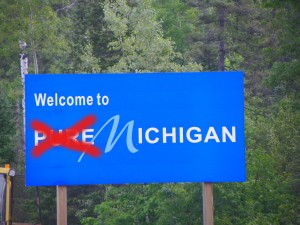‘No stricter than federal’ bill aims to make Michigan mediocre again

Our state has invested more than $260 million over the past decade in promoting tourism under the banner of “Pure Michigan.” A bill moving through the state House of Representatives would undermine that campaign by broadcasting the message that Michigan plans to do nothing more than the bare minimum when it comes to protecting the Great Lakes, our natural resources and the health of our residents.
The House Regulatory Reform Committee on Wednesday approved legislation that bars Michigan from passing any rule stricter than a federal standard unless the state can accomplish the daunting legal feat of proving such a rule is necessary.
House Bill 5613 is just the latest version of this “no stricter than federal” proposal, which now awaits action on the House floor. Gov. Snyder already vetoed a similar bill in 2011, and the same House committee failed to pass a different version of the bill last April.
This new iteration has the slight improvement of allowing the state to adopt stricter-than-federal rules if the governor can prove by “clear and convincing evidence” that such rules are necessary. (Unfortunately, that change also gives this misguided proposal the best chance of moving forward it’s had since the original 2011 bill.) But even with this exemption it is clear that approving the bill would be a big step backward for Michigan, for three major reasons: It takes away Michigan’s ability to be proactive in protecting our environment and quality of life; it would likely lead to sky-high legal costs for state taxpayers; and it cedes Michiganders’ right as a state to govern ourselves as we see fit, rather than following the whims and snail’s pace of the federal government.
Waiting for another crisis
In an attempt to downplay concerns about the impacts of this bill, its proponents have given examples of when the state could use the exemption to adopt a stricter-than-federal rule, including the Flint water crisis. But while we agree this extreme example certainly meets the bill’s clear and convincing evidence standard, we have serious doubts that the executive branch would be granted an exemption in similar circumstances without the benefit of hindsight.
Think back to the days before the Flint crisis and ask whether the governor would be granted an exemption to set a standard for lead in water stricter than the federal Lead and Copper Rule. We think it’s extremely unlikely the exemption would be granted, because the clear and convincing evidence standard is considered the second-highest standard in any legal setting, just behind the criminal conviction standard of “beyond a reasonable doubt.”
Unfortunately, the clear and convincing evidence of the need for a stricter-than-federal rule in Flint only came later, when it became known that an entire community was poisoned by its drinking water. Without some kind of crisis to galvanize the need for a stricter-than-federal standard, Michigan will be very limited in its ability to proactively craft rules that protect our public health and natural resources.
Lawyers are licking their chops
There is no doubt this bill would lead to higher litigation costs for Michigan. Environmental rules are often challenged in court, and this bill would expose the state to two new avenues for legal challenges. The first lies in defining what is stricter than a federal rule. In many cases, there may be no relevant federal rule, or the state’s regulation may be a technical attempt to clarify a federal rule. In both of these cases, it may be difficult to sort out what exactly constitutes an “applicable federal standard,” and whether it is “more stringent.”
The second avenue for legal challenges lies in the difficulty of pinning down exactly what evidence would be clear and convincing in any given case. This vague legal standard will likely lead to litigation on every single rule proposed by the state, since it would be nearly impossible to tell whether the executive branch has cleared this high legal bar without getting the courts involved.
Least common denominator
Federal environmental standards are meant to be baselines, the bare minimum required to protect public health. Michigan has in numerous instances—justifiably, and with benefits for all residents—gone above and beyond the federal minimum. For instance, Michigan has developed standards to limit algae-fueling phosphorus in our waterways, while the federal government has none. The state also has elevated its ballast water treatment standards for shipping to protect the Great Lakes from invasive species, and the federal government is now looking at adopting regulations similar to ours.
As a whole, Michiganders believe we should protect the Great Lakes and other natural wonders that make our state unique, and provide a high quality of life with abundant access to the outdoors. Time and again, we’ve gone beyond the federal minimum to make our state truly worthy of its Pure Michigan label. This bill would end that tradition by taking away our voice in regulations that directly impact our health and wellness—not to mention our tourism industry and the legacy we leave for future generations.
HB 5613 is the latest in a string of reforms and budget cuts that are supposedly designed to combat government bloat and inefficiency. Though that is a worthy goal, the results of these policies have been rubber stamping of permits and a focus on technical compliance instead of true protection of human health. Lead contamination in Flint and numerous smaller issues have slipped through the cracks.
This bill continues down that dangerous path instead of providing the reforms we need to make our state attractive to families and entrepreneurs who want to live in a place where they can enjoy forests, lakes, streams and other natural treasures that our state has in incredible abundance.
In short, HB 5613 will turn our Great Lakes into pretty good lakes and take Michigan from Pure to mediocre.
###
Photo courtesy J. Stephen Conn via Flickr adapted by Sean Hammond




Comments are closed.